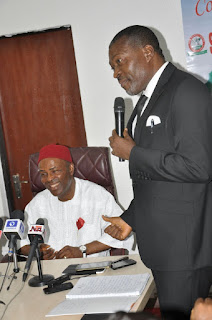Most
times the term “Youth” is defined in terms of developmental period – an age
group, often those that fall in the age bracket 15 to 24 years. But defining
youths as a social group and a transition stage tends to bring out more vividly
the identity of youths. Youths are humans transiting from the stage of
dependency to stage of freedom, from the stage of sexual immaturity to sexual
activity, from economic dependency to economic responsibility. It is a period
of liberation from direct control to a period of “all things are possible”. It
is period of testing new fits and daring the “don’ts” of the society; a period
to prove strength and express courage.
These youthful tendencies and exuberances lead to
the social vulnerability of the youths. In their quest to exercise their
assumed freedom, they tend to throw caution to the wind and sway, sometimes
uncontrollably, to their newly found fantasies, believing they are enjoying
life. Such social vices like smoking, drug abuse, stealing, robbery, kidnapping,
prostitution, thugry, etc are illicit social tendencies which they are
vulnerable to.
But it is important to point out that certain
societal factors promote youth vulnerability to social vices. Chief among them
are illiteracy, poverty, unemployment, poor parental care, war, unhealthy
political rivalries, religious strife, etc. Most of these debilitating factors
can be traced to the failure of the various administrators of the society who
have shown negligence to their primary roles to the society.
Though the youths must take responsibility for
getting involved in social vices, the drivers of the society – those in the sit
of governance – have their full share of the blame. For example, politicians
that employ youths as thugs to achieve their personal interests are certainly
the architects of this social malady. So are the religious leaders who, in
order to win followership, preach hate messages against the other groups and
inadvertently incite the youths into unhealthy rivalries, often resulting in
physical attack. The US Commission on International Religious Freedom puts
total death in Nigeria due to sectarian violence at 14,000 between 1999 and
2014. This is exclusive of deaths resulting from the Boko Haram Insurgence.
Perhaps the greatest culprits of youth
vulnerability is the government whose primary role is the maintenance of law
and order, and ensuring equity in the society. Their failure in exercising this
role as well as providing the enabling environment for socio-economic
development has contributed immensely in the heinous crimes committed on the
society by the youths. Most of the youths have lost faith in the government and
therefore move like sheep without shepherd. The Nigeria’s National Bureau of
Statistics reported that out of the 64 million youth population in Nigeria in
2012, 54% was unemployed. Out of this population, 46,836 youths were caught
involved in one crime or the other. The same report shows that 15.7% of the
crime committed was smoking of hard drugs, 8.1% were involved in theft, 7.4%
were involved in murder.
Youths have indeed been driven to criminal
activities by the actions and inactions of both the government and the society.
So many youths caught in such crimes like armed robbery, kidnapping, prostitution,
cybercrime, etc attribute unemployment to the cause of their involvement.
Working cooperatively with unemployment is the issue of illiteracy or poor
education. Survey has shown that over 70% of youths involved in crime do not
have their secondary school certificate.
T
|
ruth is that nobody opts for crime while growing
up. Recall that as a child in the primary school when pupils are asked what
they want to be in future nobody ever wanted to be a thief, a harlot, a street
urchin (an area boy), a drug peddler and the likes. You will hear them wanting
to take to such noble professions like law, engineering, music, medicine,
piloting, mass communication, teaching, etc. Taking to criminal professions by
the youths definitely is an afterthought. This is where mentorship comes in.
Proper mentorship works towards making the youths realise that they can be what
they want to be. In the Kanayo O. Kanayo Mentoring Academy, the mission is to provide
today’s youths with guidance, direction, critical thinking, motivational and
entrepreneurial skills to overcome limiting circumstances in the pursuit of
their dreams.
It
is the limiting circumstances that steer the youths off the course of their
career drive. Somebody needs to spur and prop them up – that they can make it.
Youths should be made to look at those shining stars – world class citizens – who
attained their careers from grass to grace. That is mentorship. Like a tender
stem wanting to reach the sky, mentorship shall serve as the stake for the tendril
to keep to the upward climb to the sky. Mentorship should encourage the youths to
pull their youthful energy in the positive direction towards their career
accomplishment. It shall help them to predict their future
by creating it; realise that their future and success begins with them; discover
their in-born potentials and harvest them; help to develop the I-Can-Do spirit
in them; and ultimately make them love their society and environment.
This
is what we are set to do at Kanayo O.
Kanayo Mentoring Academy. We shall work cooperatively with the key
stakeholders in youths development – including those in the government,
industry, opinion moulders as well as the society’s role models.



No comments:
Post a Comment